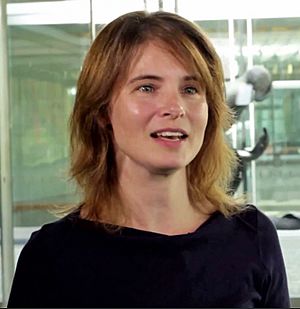Melina Hale facts for kids
Quick facts for kids
Melina Hale
|
|
|---|---|

Hale speaks to the National Science Foundation in 2014
|
|
| Education | Duke University (BS) University of Chicago (PhD) |
| Occupation | Professor |
| Employer | University of Chicago |
Melina Elisabeth Hale is an American neuroscientist and biomechanist. A neuroscientist studies the brain and nervous system, while a biomechanist looks at how living things move. She is the dean of the College at the University of Chicago. She is also a special professor in the Department of Organismal Biology and Anatomy there.
Dr. Hale studies animals like zebrafish to understand how they sense their environment and how their brains and spinal cords control their movements. This research helps us learn more about how our own bodies move.
Contents
Melina Hale's Journey and Work
Early Life and Education
Melina Hale earned her first degree, a Bachelor of Science in Zoology, from Duke University in 1992. Zoology is the study of animals. She then went on to get her PhD in Organismal Biology from the University of Chicago in 1998.
Career at the University of Chicago
After her studies, Dr. Hale worked as a postdoctoral fellow, which is like an advanced researcher, at SUNY Stony Brook and the Marine Biological Laboratory. She joined the University of Chicago as a faculty member in 2002.
Since then, she has held many important roles. She was the Dean for Faculty Affairs in the Biological Sciences Division from 2013 to 2016. She also served as Vice Provost starting in 2016. In 2017 and 2018, she was a Co-Interim Director at the Marine Biological Laboratory.
On July 1, 2023, Dr. Hale became the new dean of the University of Chicago College. She took over from John W Boyer, who had been the dean for over 30 years. As dean, she helps lead the college and its students.
Dr. Hale also leads the Society for Integrative and Comparative Biology (SICB) as its President from 2021 to 2023. This society brings together scientists who study how living things work and compare different species.
What Melina Hale Researches
Dr. Hale's research focuses on how animals move and how their senses help them do it. She wants to understand how the brain and body work together to control movement. Her work helps scientists understand biological systems better. It also helps in designing new underwater robots.
Her research has received funding from important groups like the U.S. National Science Foundation and the U.S. Office of Naval Research.
In 2015, her team showed that fish use their fins to feel their surroundings. This helps them swim better. Later, in 2020, her team published more research about how fish skin sensors work.
Awards and Recognition
Melina Hale has received several awards for her excellent work:
- Wayne C. Booth Graduate Student Prize for Excellence in Teaching at the University of Chicago
- Faculty Award for Excellence in Teaching and Mentoring at the University of Chicago
- National Science Foundation CAREER Award
- National Academies/Howard Hughes Medical Institute Education Fellow
- Defense Science Study Group Fellow, Institute for Defense Analysis
- Fellow of the American Association for the Advancement of Science

